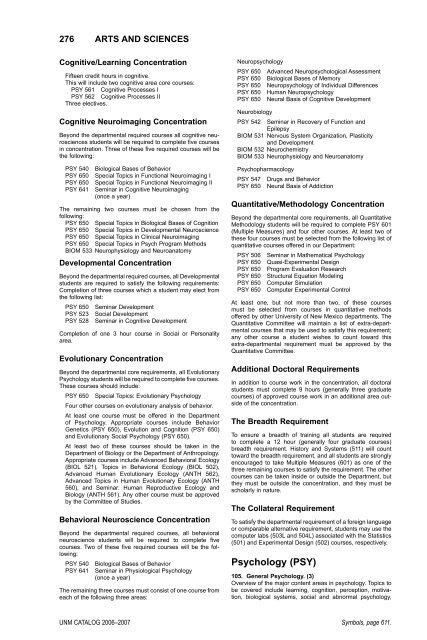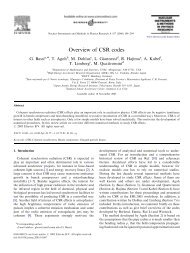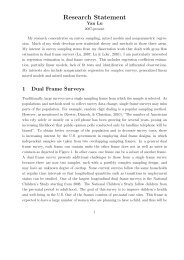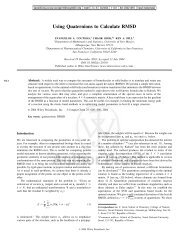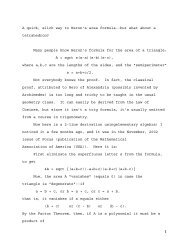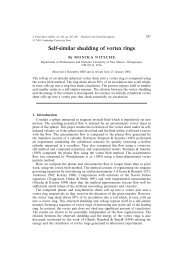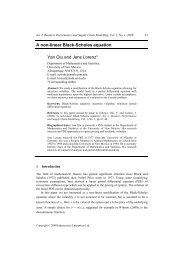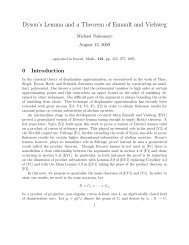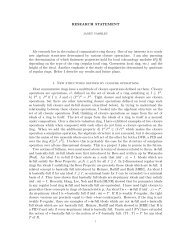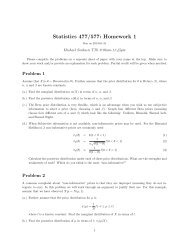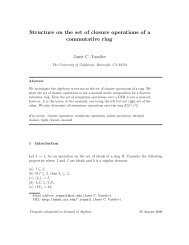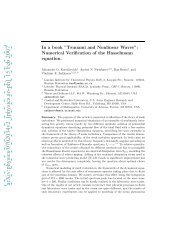OEO Office of Equal Opportunity - Department of Mathematics and ...
OEO Office of Equal Opportunity - Department of Mathematics and ...
OEO Office of Equal Opportunity - Department of Mathematics and ...
Create successful ePaper yourself
Turn your PDF publications into a flip-book with our unique Google optimized e-Paper software.
276 ARTS AND SCIENCES<br />
Cognitive/Learning Concentration<br />
Fifteen credit hours in cognitive.<br />
This will include two cognitive area core courses:<br />
PSY 561 Cognitive Processes I<br />
PSY 562 Cognitive Processes II<br />
Three electives.<br />
Cognitive Neuroimaging Concentration<br />
Beyond the departmental required courses all cognitive neurosciences<br />
students will be required to complete five courses<br />
in concentration. Three <strong>of</strong> these five required courses will be<br />
the following:<br />
PSY 540 Biological Bases <strong>of</strong> Behavior<br />
PSY 650 Special Topics in Functional Neuroimaging I<br />
PSY 650 Special Topics in Functional Neuroimaging II<br />
PSY 641 Seminar in Cognitive Neuroimaging<br />
(once a year)<br />
The remaining two courses must be chosen from the<br />
following:<br />
PSY 650 Special Topics in Biological Bases <strong>of</strong> Cognition<br />
PSY 650 Special Topics in Developmental Neuroscience<br />
PSY 650 Special Topics in Clinical Neuroimaging<br />
PSY 650 Special Topics in Psych Program Methods<br />
BIOM 533 Neurophysiology <strong>and</strong> Neuroanatomy<br />
Developmental Concentration<br />
Beyond the departmental required courses, all Developmental<br />
students are required to satisfy the following requirements:<br />
Completion <strong>of</strong> three courses which a student may elect from<br />
the following list:<br />
PSY 650 Seminar Development<br />
PSY 523 Social Development<br />
PSY 528 Seminar in Cognitive Development<br />
Completion <strong>of</strong> one 3 hour course in Social or Personality<br />
area.<br />
Evolutionary Concentration<br />
Beyond the departmental core requirements, all Evolutionary<br />
Psychology students will be required to complete five courses.<br />
These courses should include:<br />
PSY 650 Special Topics: Evolutionary Psychology<br />
Four other courses on evolutionary analysis <strong>of</strong> behavior.<br />
At least one course must be <strong>of</strong>fered in the <strong>Department</strong><br />
<strong>of</strong> Psychology. Appropriate courses include Behavior<br />
Genetics (PSY 650), Evolution <strong>and</strong> Cognition (PSY 650)<br />
<strong>and</strong> Evolutionary Social Psychology (PSY 650).<br />
At least two <strong>of</strong> these courses should be taken in the<br />
<strong>Department</strong> <strong>of</strong> Biology or the <strong>Department</strong> <strong>of</strong> Anthropology.<br />
Appropriate courses include Advanced Behavioral Ecology<br />
(BIOL 521), Topics in Behavioral Ecology (BIOL 502),<br />
Advanced Human Evolutionary Ecology (ANTH 562),<br />
Advanced Topics in Human Evolutionary Ecology (ANTH<br />
560), <strong>and</strong> Seminar: Human Reproductive Ecology <strong>and</strong><br />
Biology (ANTH 561). Any other course must be approved<br />
by the Committee <strong>of</strong> Studies.<br />
Behavioral Neuroscience Concentration<br />
Beyond the departmental required courses, all behavioral<br />
neuroscience students will be required to complete five<br />
courses. Two <strong>of</strong> these five required courses will be the following:<br />
PSY 540 Biological Bases <strong>of</strong> Behavior<br />
PSY 641 Seminar in Physiological Psychology<br />
(once a year)<br />
The remaining three courses must consist <strong>of</strong> one course from<br />
each <strong>of</strong> the following three areas:<br />
Neuropsychology<br />
PSY 650 Advanced Neuropsychological Assessment<br />
PSY 650 Biological Bases <strong>of</strong> Memory<br />
PSY 650 Neuropsychology <strong>of</strong> Individual Differences<br />
PSY 650 Human Neuropsychology<br />
PSY 650 Neural Basis <strong>of</strong> Cognitive Development<br />
Neurobiology<br />
PSY 542 Seminar in Recovery <strong>of</strong> Function <strong>and</strong><br />
Epilepsy<br />
BIOM 531 Nervous System Organization, Plasticity<br />
<strong>and</strong> Development<br />
BIOM 532 Neurochemistry<br />
BIOM 533 Neurophysiology <strong>and</strong> Neuroanatomy<br />
Psychopharmacology<br />
PSY 547 Drugs <strong>and</strong> Behavior<br />
PSY 650 Neural Basis <strong>of</strong> Addiction<br />
Quantitative/Methodology Concentration<br />
Beyond the departmental core requirements, all Quantitative<br />
Methodology students will be required to complete PSY 601<br />
(Multiple Measures) <strong>and</strong> four other courses. At least two <strong>of</strong><br />
these four courses must be selected from the following list <strong>of</strong><br />
quantitative courses <strong>of</strong>fered in our <strong>Department</strong>:<br />
PSY 506 Seminar in Mathematical Psychology<br />
PSY 650 Quasi-Experimental Design<br />
PSY 650 Program Evaluation Research<br />
PSY 650 Structural Equation Modeling<br />
PSY 650 Computer Simulation<br />
PSY 650 Computer Experimental Control<br />
At least one, but not more than two, <strong>of</strong> these courses<br />
must be selected from courses in quantitative methods<br />
<strong>of</strong>fered by other University <strong>of</strong> New Mexico departments. The<br />
Quantitative Committee will maintain a list <strong>of</strong> extra-departmental<br />
courses that may be used to satisfy this requirement;<br />
any other course a student wishes to count toward this<br />
extra-departmental requirement must be approved by the<br />
Quantitative Committee.<br />
Additional Doctoral Requirements<br />
In addition to course work in the concentration, all doctoral<br />
students must complete 9 hours (generally three graduate<br />
courses) <strong>of</strong> approved course work in an additional area outside<br />
<strong>of</strong> the concentration.<br />
The Breadth Requirement<br />
To ensure a breadth <strong>of</strong> training all students are required<br />
to complete a 12 hour (generally four graduate courses)<br />
breadth requirement. History <strong>and</strong> Systems (511) will count<br />
toward the breadth requirement, <strong>and</strong> all students are strongly<br />
encouraged to take Multiple Measures (601) as one <strong>of</strong> the<br />
three remaining courses to satisfy the requirement. The other<br />
courses can be taken inside or outside the <strong>Department</strong>, but<br />
they must be outside the concentration, <strong>and</strong> they must be<br />
scholarly in nature.<br />
The Collateral Requirement<br />
To satisfy the departmental requirement <strong>of</strong> a foreign language<br />
or comparable alternative requirement, students may use the<br />
computer labs (503L <strong>and</strong> 504L) associated with the Statistics<br />
(501) <strong>and</strong> Experimental Design (502) courses, respectively.<br />
Psychology (PSY)<br />
105. General Psychology. (3)<br />
Overview <strong>of</strong> the major content areas in psychology. Topics to<br />
be covered include learning, cognition, perception, motivation,<br />
biological systems, social <strong>and</strong> abnormal psychology,<br />
UNM CATALOG 2006–2007 Symbols, page 611.


